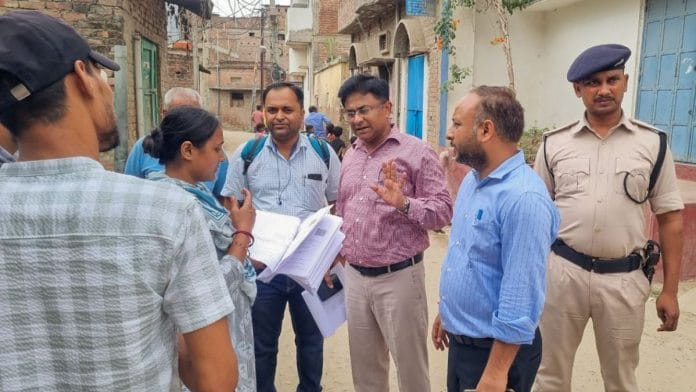New Delhi: Reiterating the presumption of authenticity attached to official government documents, the Supreme Court on Monday directed the Election Commission of India (ECI) to accept Aadhaar and Voter ID card during the Special Intensive Revision (SIR) of electoral rolls in Bihar.
“There’s a presumption of correctness with official documents… You will include these two documents (Aadhaar and Voter ID card). Any document on Earth can be forged,” Justice Surya Kant told the ECI’s counsel, rejecting its reservations over their validity.
Despite concerns about mass exclusion, the Supreme Court refused to stay the publication of the draft electoral rolls scheduled for August 1.
A Bench of Justices Surya Kant and Joymalya Bagchi said it would not interfere at this stage but warned the ECI that the entire revision process could be quashed later if any illegality was found. “Trust us—if we find anything wrong, we’ll quash it all,” Justice Kant cautioned, stressing that the Commission must focus on “en masse inclusion”.
The top court allowed the Election Commission of India to go ahead with its August 1 publication of the draft electoral rolls for Bihar, but cautioned against any process that might lead to mass exclusion of voters.
Senior Advocate Gopal Sankaranarayanan appeared for the petitioners—the Association of Democratic Reforms (ADR).
Also read: All options open, says Congress on INDIA bloc considering Bihar poll boycott over ‘tughlaqi SIR’
‘Only a draft list’
Responding to Sankaranarayan’s submission that the ECI should not finalise the roll, the Court clarified that the current stage involved only a draft list.
The Bench declined to restrain the ECI from publishing the draft electoral rolls on August 1, as scheduled under the 24 June notification for SIR. In Monday’s brief hearing, SC assured the petitioners that the matter would be heard at the earliest and asked counsel to indicate how much time each would require for arguments.
Senior Advocate Sankaranarayanan urged the Court to stay the draft list’s publication, stating that it would inconvenience nearly “4.5 crore” voters. Once published, he said, excluded persons would be burdened with the responsibility of filing objections and seeking re-inclusion. He further clarified that the prayer for a stay was not made earlier on 10 June only because the Court had then assured that it would hear the case before the date of publication.
Senior Advocate Rakesh Dwivedi, representing the Election Commission, maintained that the draft list was not final and would remain open to objections. Justice Kant echoed this view, stating that “it is, after all, a draft list,” and reiterated that “the Court can ultimately strike down the entire process if any illegality is found.” When Sankaranarayanan requested the Court to note that the process would be “subject to the outcome of the petitions”, Justice Kant responded that such an observation was unnecessary as it was already “understood”.
Inclusion of Aadhar and Voter ID card
During the hearing, the petitioners alleged that the ECI was not following the Supreme Court’s earlier advice, issued in its 10 July order, which had suggested the acceptance of Aadhaar cards, Voter ID card and Ration Cards as valid proof for verification.
In response, Dwivedi informed the court that the ECI had expressed reservations about some of these documents in its counter affidavit. He particularly flagged concerns over the widespread existence of fake ration cards. He said, “There is a large-scale issue in ration cards. We cannot accept. For Voter ID card… the pre-filled enumeration form has the Voter ID number, but since the electoral number is revised, Voter ID card cannot be conclusive.”
To this, Justice Bagchi remarked that there is “presumption of correctness with official documents” and directed the ECI to proceed with Aadhaar and Voter ID card as acceptable documents.
“You will include these two documents (Aadhaar and Voter ID card)… Wherever you find forgery, that’s on a case-to-case basis. Any document on Earth can be forged,” Justice Kant told the ECI counsel, thus not enforcing a blanket rejection.
Emphasising the need for an inclusive approach, Justice Kant urged the commission to avoid sweeping exclusions. “Instead of en masse exclusion, there should be en masse inclusion,” he said. He further asked, “If Aadhaar is inclusive, why not accept it?” noting that the ECI’s own affidavit stated the list of acceptable documents was not exhaustive, and that Aadhaar would be accepted following the Court’s guidance.
Dwivedi also clarified that the draft list under the SIR notification includes all names from the January 2025 rolls, with objections raised wherever necessary, following due process. He reiterated that the draft was open to further objections and corrections.
However, the bench maintained that the draft status does not prevent the Court from later striking down the process if flaws or illegality are proven. The Bench issued a clear warning to the Election Commission: “That doesn’t take away our power. Trust us—if we find anything wrong, we’ll quash it all. You be ready and give us a clear timeline.”
Earlier, a vacation bench of Justices Sudhanshu Dhulia and Joymalya Bagchi had orally observed that the determination of citizenship was not the Election Commission’s function and lay with the Union Government. That bench had also urged the ECI to consider Aadhaar, Voter ID, and ration cards in the Bihar SIR process.
The batch of petitions challenges the ECI’s 24 June 2025 order directing the Special Intensive Revision of electoral rolls in Bihar. Petitioners include civil society organisations such as the ADR, People’s Union for Civil Liberties (PUCL), and political leaders including RJD MP Manoj Jha, TMC MP Mahua Moitra, and Congress leader K.C. Venugopal.
The matter remains pending, with the Court yet to issue any interim order. Directions will be issued after further submissions are heard.
(Edited by Viny Mishra)
Also read: Bihar voter list revision is not anti-democratic—India can’t let illegals influence polls






